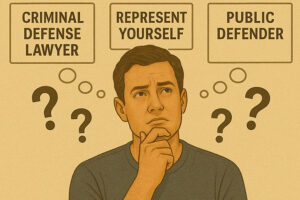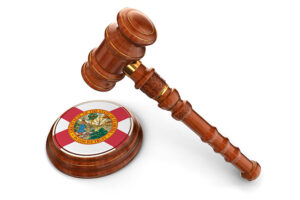
The prosecutor slides the contract across the table to you and your defense attorney. “You can take this deal, or go to trial and likely face 10 years.” They want you to believe this is your best option, and that you’re fortunate they’re offering anything at all.
But in reality, plea negotiations in St. Lucie County, FL, are one potential path forward— not a final ultimatum.
You don’t have to accept the first offer that comes your way. You don’t have to accept any offer, especially if the evidence against you is weak or illegally obtained.
The problem is knowing when a deal is fair, when to fight for better terms, and when to reject it entirely and go to trial. In this guide, we’re covering how plea bargaining works in St. Lucie County, what questions to ask before accepting anything, and when walking away is your best move.
Understanding What Plea Negotiations Are (And What They’re Not)
Plea bargaining means you plead guilty in exchange for something, such as reduced charges, a lighter sentence, or both. Under Florida Rule of Criminal Procedure 3.171, prosecutors and defense attorneys are encouraged to discuss and reach plea agreements, with the final say resting with the judge.
There are two main types of plea deals:
- Charge bargaining – The prosecutor agrees to reduce your charges. A felony might be knocked down to a misdemeanor, or multiple charges consolidated into one lesser offense.
- Sentence bargaining – You plead guilty to the original charge, but the prosecutor recommends a lighter sentence than what you’d face if convicted at trial.
But plea negotiations are not the prosecutor or the court trying to help you out of a jam. Prosecutors offer plea deals to move cases efficiently through the system, not necessarily because they believe you’re a good person.
Another harsh reality is the fact that in many cases, sentences imposed after trial can be harsher than those offered in plea agreements. This is a phenomenon often referred to as the ‘trial penalty.’
All of that said, it is possible to negotiate a plea deal that protects what you value most. In fact, over 90% of criminal cases are resolved through plea agreements rather than trials.
The key is determining whether you’re being offered a fair deal.
How to Know If You’re Being Offered a Fair Deal
Speaking from experience, we know the prosecutor will virtually never lead with their best offer. They tend to start low and hope you’ll accept it without negotiating.
Red flags that you’re being given a less-than-ideal offer include:
- An “expires tomorrow” deadline, often designed to pressure you into a quick decision
- The prosecutor won’t explain why they’re offering this particular deal
- Your attorney hasn’t conducted any investigation or filed motions yet
- The deal doesn’t account for obvious weaknesses in the state’s case
Before accepting any plea offer, it can be wise to ask yourself and your attorney these questions:
- How strong is the evidence against me? Can they actually prove every element of the crime?
- Are there Fourth Amendment issues, like an illegal search or seizure, that could get evidence thrown out?
- Are the state’s witnesses reliable, or do they have credibility problems that could hurt the prosecution at trial?
- What would happen if we filed a motion to suppress evidence?
With these questions answered, the best path forward becomes much clearer. Sometimes it makes sense to engage in plea negotiations, but depending on your case, it might not be the most effective choice.
When to Consider Accepting a Plea Deal in St. Lucie County, FL
Not every plea deal is a bad deal. Sometimes accepting one is the smartest move you can make. But other times, taking a plea means giving up rights and accepting consequences you shouldn’t have to face.
The difference comes down to the strength of the state’s case, what you’re being offered, and what you’d risk by going to trial.
Consider accepting a plea when:
- You have prior convictions that would hurt you badly at trial
- The evidence against you is overwhelming and was lawfully obtained
- Going to trial risks a much harsher sentence with mandatory minimums
- The deal knocks a felony down to a misdemeanor, which protects your record and your future opportunities
- You’re offered pretrial diversion, where charges are dismissed entirely after you complete the program
It may be unwise to accept a plea deal when:
- The “deal” barely reduces your exposure and doesn’t justify giving up your right to trial
- The prosecutor can’t actually prove you were the one who committed the crime
- Your attorney hasn’t yet had time to investigate the case or file any motions
- The evidence is weak, illegally obtained, or based on unreliable witnesses
- You’re innocent and have a strong defense
The biggest thing to remember during plea negotiations in St. Lucie County, FL, is to not let fear drive your decision. You have constitutional rights, and it’s in your best interest to leverage them.
The Plea Negotiation Process in St. Lucie County
Plea negotiations don’t just happen in one conversation. There’s a process, and understanding how it unfolds can help you know what to expect. Here’s how it typically works:
- The prosecutor makes an initial offer. This first offer is rarely their best. They’re testing to see if you’ll accept without pushing back.
- Your attorney investigates and files motions. This is where the real work happens. A skilled St. Lucie County criminal defense lawyer will dig into the evidence, identify weaknesses in the state’s case, and file motions to suppress illegally obtained evidence or challenge witness credibility.
- The prosecutor reassesses their case. Once they see that your attorney is prepared to fight and has found problems with their evidence, the landscape changes. If their case has holes or weaknesses, they’ll often soon follow up with a better offer.
- Negotiations continue. Offers and counteroffers go back and forth. Your attorney pushes for reduced charges, lighter sentencing recommendations, or even dismissal.
- You reach a deal or proceed to trial. Either the negotiations result in an agreement both sides can accept, or you reject the offer and take your chances in court.
Ultimately, prosecutors count on you being scared and focused on closing your case as soon as possible. They want you to take the first offer and disappear so they can move on to the next case.
But you deserve a criminal defense attorney who fights for a fair deal—not just any deal. At Simko Law Group, we bring something most defense attorneys don’t:
- Former prosecutor insight – We know how the state builds cases because we used to do it ourselves, which means we also know where their weaknesses are
- Strategic negotiation skills – We push back on lowball offers and don’t stop negotiating until we’ve explored every option for reducing your charges or penalties
- Trial-ready preparation – Prosecutors negotiate differently when they know your attorney is fully prepared to take the case to trial if necessary
We serve Fort Pierce, Port St. Lucie, and all of St. Lucie County. If you or someone you care about is facing criminal charges in St. Lucie County, call (561) 951-1264 for a free consultation.
We’ll review the prosecution’s offer, tell you honestly if it’s fair, and fight to get you better terms if it’s not. Don’t let fear or pressure force you into a decision that changes your life forever.
FAQs About Plea Deals in St. Lucie County
Can you change your mind after accepting a plea deal?
Yes, but only before the judge formally accepts it. Once the judge approves your plea in court, withdrawing becomes extremely difficult and requires proving coercion or ineffective counsel.
Before judicial acceptance, you can usually withdraw your plea without needing a specific reason. After acceptance, you’re essentially locked in unless you can demonstrate a serious legal problem with how the plea was entered.
Don’t accept a deal unless you’re absolutely certain it’s the right move.
Does your criminal record affect plea negotiations?
Yes. In practice, prior convictions give prosecutors leverage in negotiations, while a clean record strengthens your position and can lead to better plea offers
Prosecutors use prior convictions to argue you’re a “repeat offender” who deserves harsher treatment. But being a first-time offender with a job, family, and community ties gives you negotiating power. Your criminal history (or lack of one) is one of the most important factors prosecutors consider when making plea offers.
Does the judge have to accept a plea agreement in St. Lucie County?
No. The judge has final authority and can reject any plea deal they believe is too lenient or not in the interest of justice.
When a judge rejects a plea agreement, you have two options: renegotiate with the prosecutor for different terms, or proceed to trial. This doesn’t happen often, but it’s why having skilled legal representation matters—an experienced attorney knows which deals local judges are likely to accept.
This is one reason why it’s important to think carefully about whether you want to hire a defense lawyer or represent yourself.














